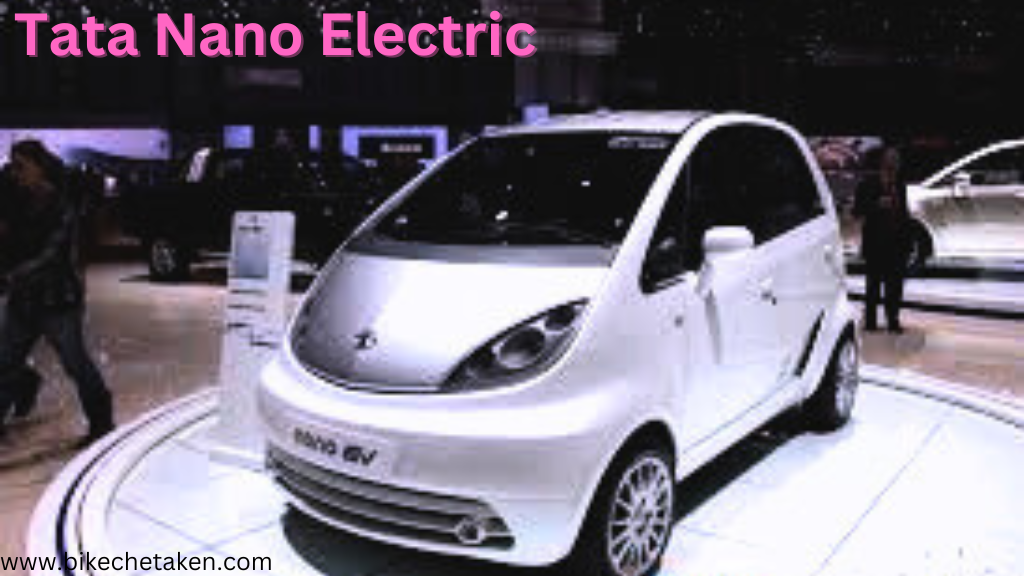Tata Nano Electric: The Affordable EV Revolution
Tata Motors has long been at the forefront of India’s automobile industry, recognized for its cost-effective and innovative vehicle designs. The Tata Nano Electric once hailed as the most affordable car globally, is making a return in an electric version.
With fuel costs on the rise and a greater focus on sustainable mobility, the Tata Nano Electric aims to revolutionize budget-friendly transportation. This article delves into the anticipated features, performance, pricing, and more about the Tata Nano Electric.
The Evolution of Tata Nano Electric 2025
Introduced in 2008, the Tata Nano was designed to be an economical car for the average Indian household. However, despite its affordability, sales remained underwhelming due to market trends and perceptions.
With the electric vehicle (EV) sector expanding rapidly, Tata Motors is now working on revamping the Nano into a more sustainable and budget-friendly EV, catering to modern-day needs.
Expected Features of Tata Nano Electric 2025
The Tata Nano Electric is likely to maintain its compact and user-friendly design while integrating contemporary advancements. Notable features include:
- Refined Exterior Styling: The EV version may sport subtle modifications like aerodynamic enhancements, LED lighting, and a redesigned grille.
- Modern Cabin Design: A more advanced interior with a digital instrument cluster, touchscreen infotainment system, and upgraded materials.
- Battery and Range: Expected to house a 17-24 kWh battery, delivering a driving range of approximately 200-250 km per charge.
- Charging Support: Likely to feature both regular and fast charging for user convenience.
- Safety Upgrades: Potential additions include airbags, ABS, and improved body strength for enhanced protection.
Performance and Specifications Tata Nano Electric
The Tata Nano Electric is designed for city commuting rather than high-performance driving. Predicted specifications include:
- Electric Motor: Expected to deliver 30-50 HP, suitable for urban travel.
- Top Speed: Estimated to be between 80-100 km/h for efficiency and safety.
- Acceleration: 0-60 km/h in approximately 10-12 seconds.
- Driving Modes: Likely to include Eco and Normal modes to optimize energy consumption.
The Evolution of Tata Nano Electric Pricing and Variants
One of the major selling points of the Tata Nano Electric will be its affordability. Given the Nano’s original positioning as a budget-friendly car, its EV version is expected to follow the same approach.
Experts estimate a price range of ₹4-6 lakhs (ex-showroom), making it a highly accessible electric car in India. It may come in different variants, each offering varying battery sizes and additional features.
Launch Date and Market Availability Tata Nano Electric
Tata Motors has yet to confirm an official release date for the Tata Nano Electric, but industry analysts expect a launch around late 2025 or early 2026. The primary target audience includes city commuters and ride-hailing service providers looking for cost-effective electric mobility solutions.
Comparison with Other Budget EVs
India’s electric vehicle market is expanding, with numerous affordable EVs available. Here’s how the Tata Nano Electric might compare:
| Feature | Tata Nano Electric | MG Comet EV | Tata Tiago EV |
|---|---|---|---|
| Expected Price | ₹4-6 lakhs | ₹7-8 lakhs | ₹8-10 lakhs |
| Battery Capacity | 17-24 kWh | 17.3 kWh | 19.2-24 kWh |
| Range | 200-250 km | 200-230 km | 250-315 km |
| Motor Power | 30-50 HP | 42 HP | 60-74 HP |
| Fast Charging | Yes | Yes | Yes |
Why Consider Tata Nano Electric?
The Tata Nano Electric brings several advantages, making it an excellent choice for budget-conscious buyers:
- Cost-Effective: With a projected price of ₹4-6 lakhs, it stands as one of India’s most affordable EVs.
- Low Running Costs: Electricity is cheaper than conventional fuels, significantly reducing daily expenses.
- Compact Structure: Ideal for urban traffic and easy parking solutions.
- Eco-Conscious Mobility: Helps lower carbon emissions, aligning with India’s green energy goals.
Challenges and Considerations
Although the Tata Nano Electric offers numerous benefits, there are some factors to take into account:
- Limited Highway Performance: Due to its lower speed capabilities, it is more suited for city travel than long highway journeys.
- Charging Infrastructure: While India’s EV charging ecosystem is growing, there are still accessibility challenges in smaller regions.
- Battery Longevity: As with all EVs, battery efficiency may decline over time, impacting range and performance.
Frequently Asked Questions (FAQs)
1. What is the expected price of the Tata Nano Electric?
The estimated price range for the Tata Nano Electric is ₹4-6 lakhs (ex-showroom), making it one of the most economical EVs available.
2. What is the expected range of the Tata Nano Electric on a full charge?
It is projected to deliver a range of 200-250 km per charge, depending on road conditions and driving habits.
3. When is the Tata Nano Electric expected to launch in India?
The launch is expected by late 2025 or early 2026, though no official announcement has been made by Tata Motors.
4. Will the Tata Nano Electric support fast charging?
Yes, it is anticipated to offer both standard and fast charging options for user convenience.
5. Is the Tata Nano Electric suitable for highway travel?
While it can be used on highways, its top speed of 80-100 km/h makes it more ideal for city commutes rather than long-distance travel.
Conclusion
The Tata Nano Electric is poised to transform India’s budget EV market, providing a cost-effective and environmentally friendly alternative to traditional fuel-powered cars.
With Tata Motors’ expertise in electric vehicle technology and the increasing demand for affordable EVs, the Nano Electric could emerge as a popular choice among urban commuters.
Despite some limitations, its affordability, efficiency, and sustainability make it a highly promising option for the future of mobility in India.










